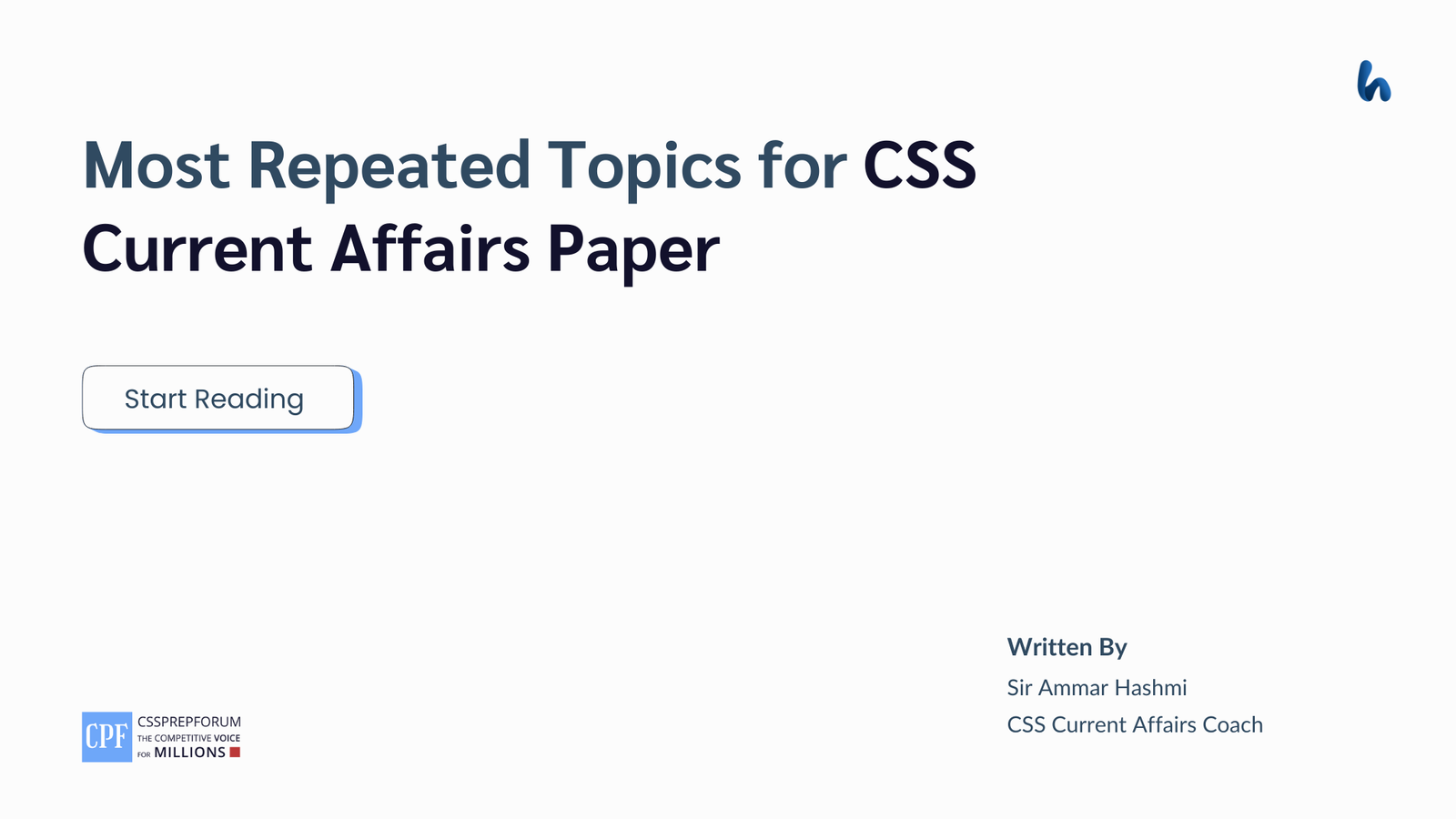Globalization Effects on Pakistan’s Education System | Daily Writeups and Opinions
The following article, “Discuss Globalization and its Effects on Pakistan’s Education System”, is written by Fahad Farooq, a student of Sir Syed Kazim Ali. Moreover, the article is written on the same pattern, taught by Sir to his students, scoring the highest marks in compulsory subjects for years. Sir Kazim has uploaded his students’ solved past paper questions so other thousands of aspirants can understand how to crack a topic or question, how to write relevantly, what coherence is, and how to include and connect ideas, opinions, and suggestions to score the maximum.

Outline
1-Introduction
2-Understanding the term Globalization
3-What are the positive effects of globalization on Pakistan’s education system?
- ✓Increased awareness about the importance of education
- Evidence: Students have realised the real importance of education to remain in competition in today’s globalized world.
- ✓Modernization of education
- Evidence: The collaboration of educationalists and policymakers worldwide has been improving Pakistan’s education standards.
- ✓Improved learning and teaching skills
- Evidence: Globalization has provided rich material for teaching and learning by high information technology.
- ✓Enhancing the access of intellectuals to the global market
- Evidence: Globalization has increased the participation of Pakistani intellectuals in the global market.
4-What are the negative effects of globalisation on Pakistan’s education system?
- ✓Increasing brain drain
- Evidence: Educated people are moving to developed states for better jobs and higher opportunities.
- ✓Popularity of English and devaluation of local languages
- Evidence: Most of the literature is available in English; therefore, English has become more popular than the local languages.
- ✓Rising imperialism of private institutions
- Evidence: The competition between public and private institutes for providing better human capital to the market has resulted in their hegemony.
- ✓Propagation of Western ideologies and a secular culture
- Evidence: The inculcation of Western education standards in the curriculum results in the country’s propagation of secular culture and capitalist ideologies.
5-What are the suggestions to reduce the negative impacts?
- ✓To make effective policies to protect the local culture and languages while following international education standards
- ✓To offer jobs and handsome salaries to educated people to reduce brain drain
- ✓To formulate governing bodies to control the imperialism of private institutes
6-Critical Analysis
7-Conclusion

Answer to the Question
Introduction
Globalization, a phenomenon in which international events and vice versa influence local happenings, has positively and negatively affected Pakistan’s education system. Under globalization, the whole world has become a global village; the concept of international borders has lost its importance. Now, the inventions being introduced in one corner of the world are simultaneously affecting the population of the other. The developed nations have achieved marvellous advancements in all fields because of their prolonged work in science and technology. However, the developing states, like Pakistan, struggle to achieve the same with their scarce resources. The biggest impact of globalization is that the students in Pakistan have realised the importance of education. They know they cannot compete in today’s globalized world without modern education. Moreover, the policymakers of education in Pakistan have started modernising the curriculum and education standards according to the Western education system. In addition, teachers’ and students’ teaching and learning techniques have also been improved by the induction of advanced computer-assisted techniques and information technology. On the other hand, globalization also has some negative impacts. It has turned educational institutes from knowledge provider sources to human resource providers for the global market. This has created competition among educational institutes, thus leading to the hegemony of private institutions. In addition, the inculcation of Western education standards in the curriculum has been demolishing the local moral and cultural values among the students. To mitigate these challenges, educationists and policymakers should manage, not oppose, the incoming advancements in the field of education while designing the curriculum, keeping the national priorities in view. The government should formulate governing bodies to control the imperialism of private institutes. The solution to these challenges is the need of the hour to survive in this globalized world. This essay explores the effects of globalization on Pakistan’s education system and the measures to mitigate its negative impacts.
Understanding the term Globalization
Globalisation refers to transforming the world into a global village due to increased advancements, especially in information technology. Now, people living in one corner of the world are aware of the events happening in the other corner of the world due to media, the internet, and other resources. The concept of international borders has little importance in today’s global world. While sitting in their homes, people can now succeed in the international markets with the help of information technology. They can buy and use the things of foreign brands that are not readily available in their home countries. Thus, the phenomenon of globalisation has been revolutionising people, their lifestyles, and businesses across the globe. The phenomenon has affected all spheres of life, including social, industrial, and agricultural sectors. With no exception, globalisation has affected the education sector of developing countries like Pakistan. While it has brought about positive changes in Pakistan’s education sector, it has also had some bad impacts.
Positive impacts of globalisation on Pakistan’s education system
Increased awareness about the importance of education
The most prominent impact of globalisation is awareness about the importance of education among students. They have realised that education is the basic pillar upon which an individual’s and a country’s development stands in today’s modern world. Without modern education, they cannot compete with developed nations in the global market. Social media and other digital revolutions have revealed that the youth must get a modern education if they want to earn prestige in the world.
Modernisation of education
Globalisation has modernised all countries’ education systems after the advent of various technologies. Pakistan has also included various latest topics in the curriculum to prepare the students for the global market. Scientific subjects and rational approaches have been replacing the traditional education system. The collaboration of educationalists and policymakers worldwide has been improving Pakistan’s education standards. Now, the students graduating from Pakistani universities are well-equipped with the latest knowledge, and they are joining international corporations and research organisations.
Improved learning and teaching skills
Globalisation has provided rich material for teaching, and teachers are improving their teaching skills by joining various conferences in the country. Moreover, they can travel to foreign countries to attend training programs to nurture their teaching skills. Similarly, students are getting help from online resources while sitting in their homes. The students have free access to online video lectures and research websites. They are getting help from computer-assisted techniques in their work. Furthermore, they are connected with the latest technological advancements in developed countries. People now have no problem sending their children abroad for higher education because they can remain in touch with them with the help of advanced technology.
Enhancing the access of intellectuals to the global market
Since globalisation has raised the technical skills of students, teachers, and researchers in Pakistan by transferring the latest skills and knowledge, Pakistan is trying to improve its education system further to provide the best human resources to the international market. The global market requires competitive and innovative professionals; therefore, Pakistan’s government has provided scholarships and the best facilities to higher education students. These students and intellectuals working abroad have been improving Pakistan’s global image. They are not only helping the country economically, but they are also participating in improving the education standards in Pakistan.
Negative impacts of globalisation on Pakistan’s education system
Where globalisation has benefitted Pakistan’s education system, there have also been some negative impacts.
Increasing brain drain
Indeed, globalisation has modernised and improved Pakistan’s education system to international standards. But, the issue is that Pakistani students, professionals, and intellectuals have been moving to developed states for better opportunities. The government has been spending a huge amount on scholarships for higher education, but they settle abroad after acquiring the desired skills and do not return to Pakistan. Thus, Pakistan has not only suffered the loss of valuable and skilled persons but also has to bear the expenses of training and evaluating new ones.
The popularity of English and the devaluation of local languages
Since most of the modern literature is available in the English language, people pay more attention to the English language than the regional languages to better use the latest technologies to benefit. English has proved to be a source of prosperity and development as all the technologies and inventions developing worldwide are mostly available in this language. People in developing countries like Pakistan feel honoured and privileged to speak English publicly. Most of them, therefore, are weak in their mother languages, and they speak a mixture of languages while preferring English. This way, the local and regional languages become vulnerable before English.
Rising imperialism of private institutions
Globalisation has turned educational institutes from knowledge provider sources to human resource providers for the global market. This has created competition among educational institutes, thus leading to the hegemony of private institutions. In addition to the local private educationalists, foreign educationalists have also laid their foundations in Pakistan through various branches of their institutes. Thus, the private sector has turned into a high-profit earning sector. Students pay high fees to these educational institutes to gain knowledge of international standards. The government has still failed to regularise these private institutions and force them to provide the knowledge of international standards with low fees.
Propagation of Western ideologies, secular culture
The inculcation of Western education standards in the curriculum is resulting in the propagation of secular culture and capitalist ideologies in the country. To meet the requirements of the global market, Pakistan has updated its curriculum according to the pattern of Western countries. Moreover, different international organisations, like UNO, IMF, and World Bank, that support and fund the educational institutes in Pakistan impose and propagate their ideologies in the country. As a result, secular culture has prevailed in the country, especially in the urban areas. Our religious and cultural values are at the stake of these Western ideologies. The Western education system has been distancing the students from the religion as well as the Eastern culture.
Suggestions to reduce the negative impacts
Undoubtedly,globalisation has strongly impacted Pakistan’s education system, but its impacts are not all positive. There is a dire need to minimise the negative impacts of globalisation. For this purpose, the government should include the English language and Western style of education in such a way that the local languages and culture are not ruined. Policymakers should design the curriculum to allow national interests and ideologies to remain dominant over Western ideologies. Moreover, the higher education commission should control the brain drain by making strict policies. It should be made compulsory for the outgoing students and intellectuals for research and higher education to return to Pakistan after completing their studies or research work. To attract professionals, the government should offer them handsome salaries and facilities of international standard. Last but not least, the government should make governing bodies to control the activities of private institutions. The expenses of education in private institutes should be bearable for poor students to get an international standard education.
Critical Analysis
Pakistan’s education system has been trying to meet international standards in today’s globalised world by adopting the latest technologies and updated curriculum. The traditional way of teaching and learning is on a continuous decline. Teachers and students can now use various global resources for information and knowledge while sitting in their homes. Looking at the other side of the coin, globalisation has also created some challenges for Pakistan’s education system. Western culture and ideologies have dominated the local culture and traditions. People have started feeling shame in adopting the local values and honour in practising liberal values. However, educationists and policymakers have noticed all the shortcomings and are fully determined to mitigate the negative impacts of globalisation.
Conclusion
To conclude, globalisation has brought significant developments worldwide in all fields, such as economics, society, and education. In the process of globalisation, technologies, people, and other things move from one place to another without considering the concept of borders and other limitations. In addition, globalisation has had positive and negative impacts on the education system of developing countries, especially Pakistan. The positive impacts Pakistan has been enjoying are the rising awareness among the students, modernisation of education as per international standards, improvement in the skills of teachers and students, and the access of local researchers in the global market. On the other hand, globalisation has also imparted some negative impacts. For instance, the migration of local brains towards the developed states, devaluation of local culture and languages, the rising imperialism of the private institutes, and the propagation of Western ideologies in the country are some bad impacts. Now, the government should take immediate measures to minimise the negative impacts; otherwise, the education sector will suffer more in future. To control the brain drain, the higher education department should reshape the policies for outgoing students. In addition, public and private educational institutes should be provided equal resources and similar curricula to eradicate the rising class division in society. Finally, policymakers should also focus on designing such a curriculum so that foreign cultures and ideologies do not compromise the national interests and culture.

CSS Solved Past Papers’ Essays
Looking for the last ten years of CSS and PMS Solved Essays and want to know how Sir Kazim’s students write and score the highest marks in the essays’ papers? Then, click on the CSS Solved Essays to start reading them.
CSS Solved Essays
CSS Solved General Science & Ability Past Papers
Want to read the last ten years’ General Science & Ability Solved Past Papers to learn how to attempt them and to score high? Let’s click on the link below to read them all freely. All past papers have been solved by Miss Iqra Ali & Dr Nishat Baloch, Pakistan’s top CSS GSA coach having the highest score of their students. General Science & Ability Solved Past Papers












